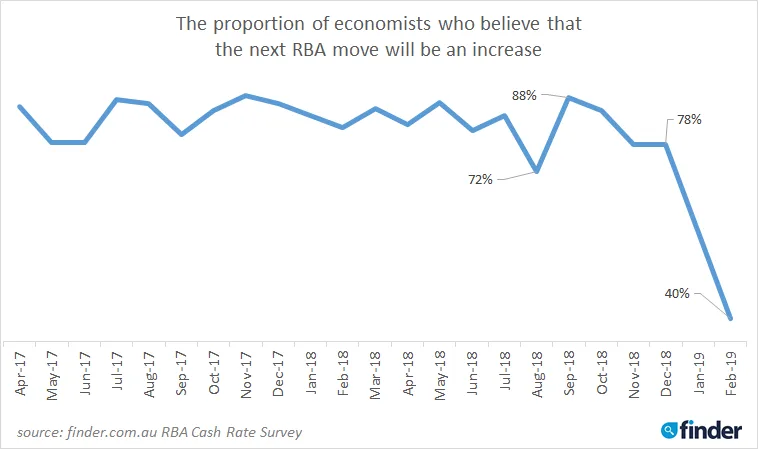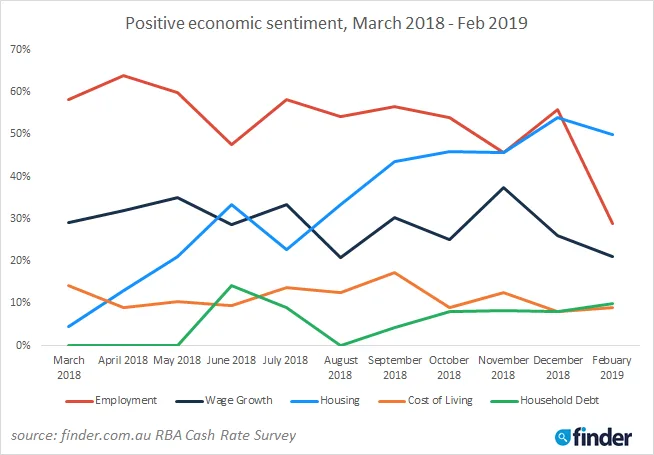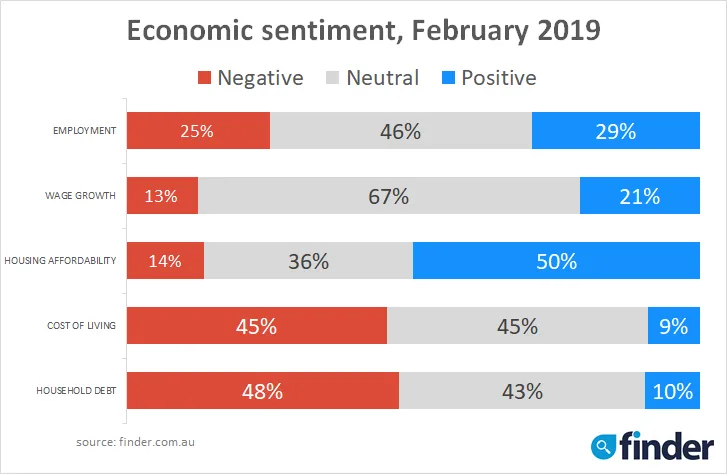- Bessie Hassan
- Head of PR & Money Expert
- finder.com.au
- +61 402 567 568
- Bessie.Hassan@finder.com.au
Media Release
RBA Survey: Experts predict cash rate cut to come, not hike
- 60% of experts now expect easing of cash rate, up from 10–20% in last 2 years
- Positive sentiment in employment and wage growth dropped dramatically
- Housing affordability sentiment continues to remain strong
4 February, 2019, Sydney, Australia – A cash rate cut from the Reserve Bank of Australia (RBA) seems more likely now than it has in years, according to Finder, Australia’s most visited comparison site.
All 28 experts and economists in Finder’s RBA cash rate survey are expecting a hold at 1.50% on Tuesday, but their predictions swung dramatically about the direction of the next move to come.
For the past two years, about 80% of experts have predicted a hike as the next cash rate move. This month, only 40% (11/28) did so.
Stephen Koukoulas, managing director at Market Economics said he could see a change happen in as little as a month.
"[The RBA] will acknowledge the economy is weaker than when it last met and will signal a change in bias towards an easing.
“It may wait a month or two before acting on that bias," Koukoulas said.
Graham Cooke, insights manager at Finder, said of the panelists who put a date on their rate drop, predictions were pretty evenly spread throughout the year from March to November.
“This is the most dramatic shift I have seen in four years of running our cash rate survey.
“Economists are now swinging significantly in favour of a cut this year, but nobody can agree on exactly when this will happen,” Cooke said.

Cooke said that the severity of the housing downturn in recent months was the top reason cited by experts who changed their prediction.
"Along with housing concerns, inflation is still sitting below two per cent, so another cut may be needed to stimulate the economy.
"The only issue with further cuts is that it reduces the ability of the RBA to adapt to softer economic conditions in the future," Cooke said.
Finder's Economic Sentiment Tracker has also seen a significant shift.
Positivity regarding employment in Australia fell from 56% in December to just 29% in February.
Economists indicated that, though unemployment is still low, a weakening of job prospects looms on the horizon.
Koukoulas said the economy is on a slower growth path, judging by GDP.
"Looking at many economic factors, it looks like growth will be weaker in the next quarter.
"The labour market tends to lag behind the greater economy by a couple of quarters.
"This trend – combined with lower job vacancy advertising numbers – indicates a risk that employment will be weaker in the first half of this year versus previous years," Koukoulas said.

Cooke said the results aren't all gloom and doom.
"With house prices continuing to tumble, the outlook for housing affordability remains strong.
"It's true some lenders are making out-of-cycle rate hikes – we've seen 96 in the loans we compare on Finder so far this year – but not all banks are raising rates. In fact we've also seen 69 lenders cut rates.
"The bottom line is if you're looking to buy now, it's overwhelmingly a buyer's market. Use your bargaining power and look for value before you buy," Cooke said.

Here's what our experts had to say:
Shane Oliver, AMP Capital: "While economic data has generally been soft since the last Board meeting in December, it's unlikely to have been weak enough yet to prompt the RBA to cut rates, particularly given that its bias has still been to raise rates."
Alison Booth, ANU: "The fundamentals have not yet altered sufficiently to warrant [the RBA] to change."
John Hewson, ANU: "Data uncertainty and concern economy is slowing."
Malcolm Wood, Baillieu: "Underlying inflation is below the low end of the RBA's target band and underlying economic momentum appears to be deteriorating."
Ben Udy, Capital Economics: "The housing downturn is becoming more severe and will weigh on the economy over 2019. But given the labour market remains in good shape for now, we suspect the RBA will remain on hold for the time being."
Michael Blythe, CBA: "Reasonable economic backdrop says next move is probably up. But low inflation means no hurry to act."
Trent Wiltshire, Domain: "The RBA is very reluctant to cut rates. Despite some weak economic data since the December meeting the RBA will maintain a fairly optimistic outlook for the economy."
Peter Gilmore, Gateway Bank: "Growth is still likely to be above trend."
Mark Brimble, Griffith Uni: "There is little net direction from indicators, with an overall bias to more support being needed given the out of cycle increases of rates by institutions."
Tim Nelson, Griffith University: "There is no strong case for an adjustment of monetary policy."
Peter Haller, Heritage Bank: "Economic conditions have not materially changed since the previous RBA meeting in December and there is no basis for a change at this time."
Tim Reardon, Housing Industry Association: "GDP remains solid. Unemployment low and no evidence of inflationary pressure."
Michael Witts, ING: "Despite the increased market talk about the prospect of an easier stance from the RBA, if this scenario is to emerge it is likely to be around mid year. Underlying economic data remains positive for the time being."
Peter Boehm, KVB Kunlun: "No reason to move rates at this stage."
Leanne Pilkington, Laing+Simmons: "Some economists now believe the next official rate movement will be down instead of up. The Reserve Bank will need firm justification as a move either way will be heavily scrutinised. We don't see any justification to adjust rates at this time."
Stephen Koukoulas, Market Economics: "It will acknowledge the economy is weaker than when it last met and will signal a change in bias towards an easing. It may wait a month or two before acting on that bias."
John Caelli, ME Bank: "Given low unemployment and wages are starting to rise, the Reserve Bank is unlikely to cut rates in the near term. Likewise, with house prices continuing to fall, tightening credit, and CPI below the target band, a rise in the cash rate is also unlikely. It's wait and see for now."
Michael Yardney, Metropole Property Strategists: "The jobs growth figures for December will give the RBA comfort at a time of slower local economic growth and difficult world economic circumstances. With no wages growth and our challenging property markets and the real likelihood of further falls in property values especially in Sydney and Melbourne, the RBA will now have to seriously consider the option of lowering rates this year."
Mark Crosby, Monash University: "While the international situation is deteriorating, there is no reason to move rates at the February meeting."
Jacqueline Dearle, Mortgage Choice: "As wages continue to flat line and spending appears to be fuelled by a mix of credit and savings, consumers may be entering 2019 with a slightly pessimistic view. Continued low inflation, that's sitting below Governor Lowe's target; and the softening property market coupled with the tightened lending environment, only adds to disappointing Australian GDP/economic and global concerns stemming from Trump's trade war with China. The upcoming federal election also adds a feeling of stasis to lacklustre economic data. In February, a myriad of signposts continue to suggest rates remaining on hold but down the track the next move in the cash rate could well be downward. However this could impact on the Aussie dollar, giving the RBA a lot of big issues to consider as the New Year kicks off."
Dr Andrew Wilson, My Housing Market: "Although recent data is clearly increasing the chances of a near-term cut in official rates, recent statements by the RBA continue to indicate an ongoing conservative stance on rate settings. This however is likely to change if GDP data to be released on March 6 is again disappointing. In those circumstances the RBA will be motivated to cut rates - particularly prior to the onset of a likely lengthy federal election campaign."
Matthew Peter, QIC: "The market is now pricing the next move of the RBA to be a 0.25% cut sometime in early 2020 as China slows and the housing market continues to correct. These headwinds are yet to derail the economy, as shown by the strong December labour market data. The RBA will stay on hold until 2020, but failing a crash in China and the housing market, the next move in rates will be up."
Noel Whittaker, QUT: "There is no way they will increase them with the housing market the way it is – and I can't see them reducing them."
Nerida Conisbee, REA Group: "Economic data coming out is still too mixed to make a decision to move rates. While CPI remains low, and GDP growth in September was lower than expected, unemployment is now at just 5%. In Sydney, it is at its lowest rate since 1974."
Christine Williams, Smarter Property Investing P/L: "The economy is not as strong as expected. Also I believe the RBA is waiting for Royal Commission Report to be released."
Janu Chan, St.George Bank: "There continues to be strength in the labour market. However, the downside risks for the global economy has increased. The Australian economy is also not growing as strongly as previously thought. The balance of these risks suggests the RBA could tone down its stance of the next move being up but to remain on hold for some time. However, not likely to the extent that the RBA will be ready to lower rates."
Richard Holden, UNSW: "No chance they raise given housing and inflation."
Other participants: Bill Evans, Westpac
###
For further information
- Bessie Hassan
- Head of PR & Money Expert
- finder.com.au
- +61 402 567 568
- Bessie.Hassan@finder.com.au
Disclaimer
The information in this release is accurate as of the date published, but rates, fees and other product features may have changed. Please see updated product information on finder.com.au's review pages for the current correct values.
About Finder
Every month 2.6 million unique visitors turn to Finder to save money and time, and to make important life choices. We compare virtually everything from credit cards, phone plans, health insurance, travel deals and much more.
Our free service is 100% independently-owned by three Australians: Fred Schebesta, Frank Restuccia and Jeremy Cabral. Since launching in 2006, Finder has helped Aussies find what they need from 1,800+ brands across 100+ categories.
We continue to expand and launch around the globe, and now have offices in Australia, the United States, the United Kingdom, Canada, Poland and the Philippines. For further information visit www.finder.com.au.
12.6 million average unique monthly audience (June- September 2019), Nielsen Digital Panel